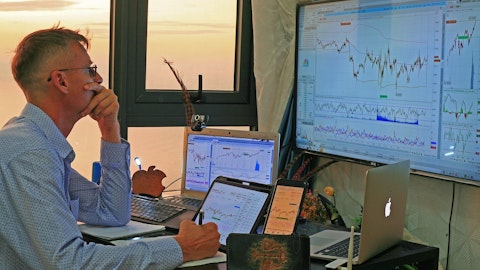Neil Hunn: Yes. So I appreciate the opportunity there. So let’s just take it by those three. So ConstructConnect, to remind you what it is, right, so we have a near perfect database of all the construction — commercial construction projects that are in the planning phase across North America. As a result, when — it has a bit of countercyclical demand attached to it. So when there is a tremendous amount of new projects and you’re a subcontractor general contract and building product manufacturing and business is flowing from everywhere, then you don’t have to look too hard for what you’re going to do next. When there’s fewer projects, then you subscribe to the subscription service of ConstructConnect so you can identify what projects are coming down the pipe that you want to try to bid for and win.
And so the ConstructConnect has been a modestly good performer for us over the years. We expect it to actually have a good run here in ’23 as a result. Deltek does have — it’s been a strategic focus of Deltek. Deltek is 60% government contracting, 40% private sector and private sector. The smallest sliver is construction and we sell software to large contractors. That’s what we do. That business, we — in our prepared comments, we talked about how the private sector was very strong in Q4 for Deltek. We would expect and do anticipate some softening on the construction side for Deltek in 2023, and we think we have that fully covered in our guidance. And then Neptune, we believe strongly Neptune is not a cyclical business. As you sell water meters and water meter technology to the municipalities when they’re — they tend to have a budget for meters.
When there is a large new residential new construction, then a higher percentage of the budget goes to install new meters. When there’s fewer new starts, the budget stays the same, but they take the meters and they do the retrofits and trade outs of the aging fleet and infrastructure. So that is a general cross-cycle sort of view of Neptune, But then we’re further — our confidence is further buoyed by the fact that we have this just unprecedented amount of backlog at Neptune for 2023. So we think that Neptune will perform well for us this year.
Brendan Luke: Very useful. Thank you.
Operator: And our next question today comes from Rob Mason at Baird. Please go ahead.
RobMason: Yes, good morning. And congrats as well to Jason and Rob. Maybe just stick on the technology-enabled products area. I think the — there was a mention of some products didn’t ship in the quarter maybe got pushed. Just to step back, maybe update us where you think you are around supply chain just on the product side in your businesses? And then I’m curious what kind of impact that those deferral shipments might have had in the fourth quarter?
Neil Hunn: Let me just set it up, and I’ll hand it over to Jason. So in TEP, we talk obviously — about Neptune, we talk about medical process. There’s also a small cohort of RF product businesses and RF Ideas. The fourth quarter was particularly brutal supply chain wise on those RF product businesses. And so with that, I’ll give it to Jason to sort of talk through anything you’d like to.
Jason Conley: Yes. It wasn’t significant. It was probably in the $5 million to $10 million range, and it was across a number of businesses. So I think we expect the first quarter for TEP to be up a little bit more than the rest of the year because of that and because of some of the easier comps. So maybe low double digits in the first quarter, but that’s sort of the range. So yes, a lot of this is in the rearview. Of course, things do pop up here and there, but we’re not hearing as much sort of meaningful impact in the quarters.




